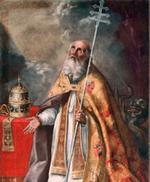Fathers of the Church
Epistle XXXVI: to Leo, Bishop
by Gregory the Great in 590-604 | translated by James Barmby, D.d
Gregory to Leo, Bishop of Catana.
We have found from the report of many that a custom has of old obtained among you, for subdeacons to be allowed to have intercourse with their wives. That any one should any more presume to do this was prohibited by the servant of God, the deacon of our see, under the authority of our predecessor, in this way; that those who at that time had been coupled to wives should choose one of two things, that is, either to abstain from their wives, or on no account whatever presume to exercise their ministry. And, according to report, Speciosus, then a subdeacon, did for this reason suspend himself from the office of
administration, and up to the time of his death bore indeed the office of a notary, but ceased from the ministry which a subdeacon should have exercised. After his death we have learnt that his widow, Honorata, has been relegated to a monastery by thy Fraternity for having associated herself with a husband. And so if, as is said, her husband suspended himself from ministration, it ought not to be to the prejudice of the aforesaid woman that she has contracted a second marriage, especially if she had not been joined to the subdeacon with the intention of abstaining from the pleasures of the flesh.
If, then, you find the truth to be as we have been informed, it is right for you to release altogether the aforesaid woman from the monastery, that she may be at liberty to return without any fear to her husband.
But for the future let thy Fraternity be exceedingly careful, in the case of any who may be promoted to this office, to look to this with the utmost diligence, that, if they have wives, they shall enjoy no licence to have intercourse with them: but you must still strictly order them to observe all things after the pattern of the Apostolic See.
Taken from "The Early Church Fathers and Other Works" originally published by Wm. B. Eerdmans Pub. Co. in English in Edinburgh, Scotland, beginning in 1867. (LNPF II/XII, Schaff and Wace). The digital version is by The Electronic Bible Society, P.O. Box 701356, Dallas, TX 75370, 214-407-WORD.






